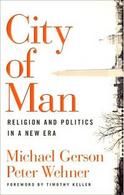Gerson & Wehner begin their book, City of Man, with a comparison of the church during Nazi Germany and the church during the civil rights movement. The Christians during 1930’s Germany largely accommodated themselves to the status quo, all the while, atrocities were occurring in staggering proportions. Followers of Christ during the 1960’s in America provide a contrasting view of the role that our faith should play in our politics. Largely, but not exclusively, African-American Christians, “emphasized the equality of individuals rooted in the image of God, the power of redemptive suffering, and the biblical promise of liberation given to the Hebrews in Egyptians slavery.”
These two examples make clear the consequences that are at stake when it comes to Christians and our political theology–Especially, during this age of private religion. The authors argue, “Christians in germany should have been more public in confronting Nazi authorities. Americans have reason to be grateful that the leaders of the civil rights movement did not regard their faith as something fundamentally private.”
Join the groove: If these two examples are the extremes of a continuum, then, today when you look at the church in America, which end of the spectrum do you think we find ourselves?

